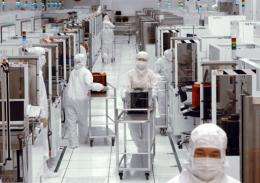United Microelectronics Corp (UMC) engineers push trollies at a factory in southern Taiwan. Taiwanese scientists have unveiled an advanced microchip technology which they claimed marks a breakthrough in piling ever more memory into ever smaller spaces. Taiwan is among the top four microchip producers in the world.
Taiwanese scientists on Tuesday unveiled an advanced microchip technology which they claimed marks a breakthrough in piling ever more memory into ever smaller spaces.
The scientists said they had succeeded in producing a circuit measuring just nine nanometres across.
"Researchers used to believe that 20 nanometres was the limit for microchip technologies," said Ho Chia-hua, who heads the team behind the project at the state-run National Nano Device Laboratories.
A chip using the new memory technology has about 20 times the storage capacity of memory units now available on the market and consumes just one 200th of the electricity, the scientists said.
The benefits of greater memory and reduced electricity consumption are highly sought in the manufacture of electronic gadgets like smart phones and tablet computers.
Using such technology, a chip the size of one square centimetre will be capable of storing one million pictures or 100 hours of 3D movies, said Yang Fu-liang, the director general of the Laboratories.
However, Nobunaga Chai, an analyst of the Taipei-based electronics market research unit Digitimes, said it would be some time before anyone could start making money on the technology.
"I'm afraid it will take several years before the advanced technology can be turned into commercial use," he told AFP.
Taiwan is among the top four microchip producers in the world.
(c) 2010 AFP























